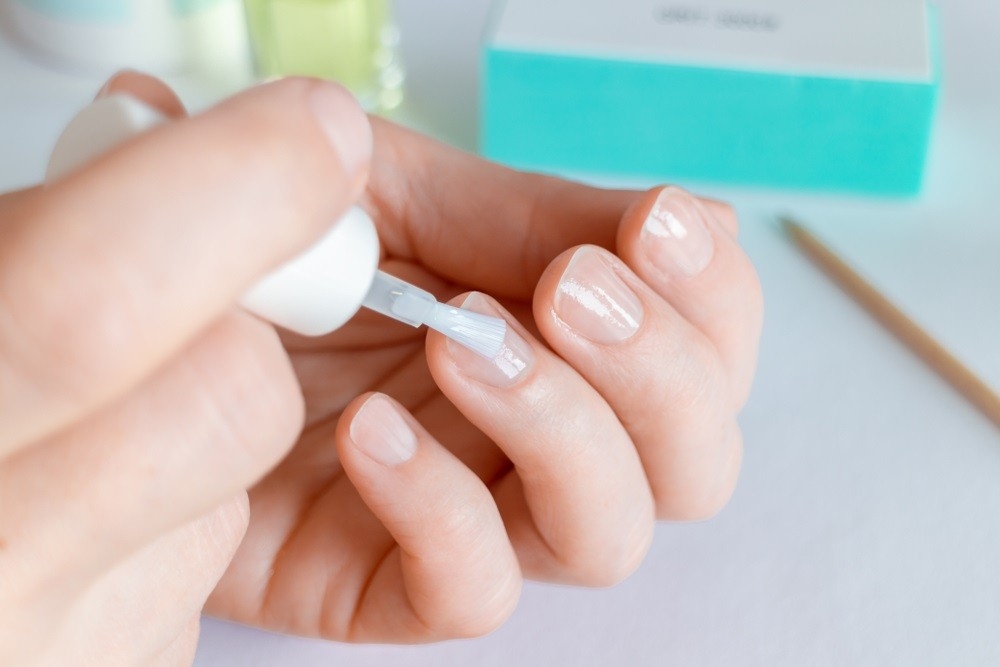Contents
- Nail strengthener vs. nail hardener
- A nail hardener is described
- Nail hardeners come in two varieties
- Hardeners for reinforcement
- Handprint on a white fabric
- Nail hardeners, their benefits, and drawbacks
- Why do my cuticles keep itching?
- How do you strengthen your nails?
- The ingredients in nail hardeners
- How should i choose between hardening and strengthening my nails?

Your fingernails and toenails require your undivided attention. But which of nail hardeners and nail strengtheners is best when it comes to treating your nails? A nail hardener provides your nails with a sturdy shield against chipping and breaking. In the meanwhile, using a nail strengthener can promote long-term nail health. Proper nail care with Maby blog.
Nail strengthener vs. nail hardener
If you want to discover which nail hardener or nail strengthener is best for your nails, keep reading!
A nail hardener is described
A nail hardener is a special sort of thick, transparent lacquer that, once dry, forms a hard, protective covering over the nail. This lotion is great for avoiding both edge chipping and complete nail breakage. This means that a nail hardener is the most reliable product for achieving your aim of long, healthy nails.
However, before deciding to incorporate nail hardeners into your routine, there are a few things you should know.
Nail hardeners come in two varieties
Reinforcing hardeners and cross-linking hardeners are the two main categories of nail hardeners available today.
Hardeners for reinforcement
Nail hardeners that reinforce the outside rather than the inside of your nails are what we’re talking about here. There is no need to alter the nail itself when using a strengthening hardener because it merely adds a thin, protective layer on top. Several ingredients, such as sulfhydryl protein and nylon, work together in a reinforcing hardener to accomplish this.
Like base coats, strengthening hardeners work by creating a protective layer over your nails to make them feel firmer than they did before.
Handprint on a white fabric
Intensifiers of Cross-Linking. Think of your nail as a ladder to better understand how cross-linking hardeners work. Nails that aren’t properly cared for can cause the ladder’s steps to be shaky and weak. Adding a cross-linking hardener, however, is like adding extra supports to a ladder. Ingredients like calcium and formaldehyde in a cross-linking hardener can interact directly with the protein in your nails to strengthen them.
The keratin protein in your nails can be made harder and less pliable by using a cross-linking hardener. If you want strong, long nails, these things will help.
You may get the necessary reinforcement for your nail plates from any of these products.
Nail hardeners, their benefits, and drawbacks
It’s simple to incorporate nail hardeners into your routine. This is equivalent to applying a foundation coat. Simply paint on a single layer and let it dry to complete your manicure. It will harden to a durable and lustrous finish.
There are certain drawbacks to using nail hardeners, despite the fact that they can make your nails grow much longer than they normally would. If you use nail hardeners often, for instance, your nails will become inelastic and brittle, making them more likely to break.
Additionally, some nail hardeners include potentially harmful chemicals. Formaldehyde is one of these, but it can be harmful to the nails over time. If you use the product frequently, this ingredient may also cause it to shatter or lift. The good news is that substitutes with less risky components are readily accessible.
Why do my cuticles keep itching?
It is imperative that formaldehyde-containing products be used sparingly. Use of a nail hardener containing formaldehyde on occasion is unlikely to produce any harm, similar to the use of other potentially harmful products. Because of this, you should limit how often you use it.
You could fool yourself into thinking you can prevent your strong nails from breaking. However, the opposite is true. Nails treated with cross-linking hardeners can become so rigid that they break easily if bent in any way. One potential drawback of using a reinforcing hardener is that it needs to be reapplied frequently in order to provide enough protection.
This suggests that a nail hardener could be useful if you want to strengthen your nails or grow them out. However, these are completely safe options. If you want longer nails, make sure to do a patch test and use the product as directed on the label.
How do you strengthen your nails?
When it comes to keeping your nails in good condition, a nail strengthener is just as important as a cuticle oil, nail files, and buffers. These items provide essential nutrients to the nail plate, which in turn increases the nail’s resilience to wear and strength.
Improve the health of your natural nail plate with the help of a nail strengthener that feeds and shields your nails. The strengthener can help fortify the nail’s structure and provide the nail plate with vitamins and nutrients to promote growth by acting as a flexible protective layer.
Keratin, a form of keratin found in healthy, strong nails, provides durability and toughness. However, nail strengtheners are helpful for brittle, soft, or otherwise weak nails because keratin isn’t found in them.
The ingredients in nail hardeners
There are several varieties of nail strengtheners, each with its own unique chemical makeup. The capacity of the chemicals in any given strengthener to penetrate the nail bed depends on their specific chemical makeup.
The most effective nail strengtheners combine a strengthening formula with a nutrient delivery method. Plasticizers and solvents such as tosylamide formaldehyde resin, nitrocellulose, butyl acetate, and ethyl acetate are commonplace in nail strengthener formulas. Most nail-fortifying chemicals wear off quickly, so regular reapplication is necessary to maintain their effectiveness.
How should i choose between hardening and strengthening my nails?
If you’re still unsure which one to use, a nail strengthener is a preferable option if your nails are dry and peel easily. The only potential drawback is that improvement could take some time to materialize.
Meanwhile, nails that are prone to breaking can benefit from a specifically formulated nail hardener. However, overuse could cause your nails to become extremely hard and prone to breaking.
Consider both of these factors before making a purchase. In addition, please refer to: The secret to healthy, strong nail is nail slugging.
